

Fixing Common Errors: See, Look, and Watch. BBC Learning English - Course: English In A Minute / Unit 1 / Session 84 / Activity 1. English On The Go Ep 10: Lie and lay. Is It 'Hanger' or 'Hangar'? - Merriam-Webster Ask the Editor. Glossary of Usage: Index of Commonly Confused Words. "Advice" or "advise"?
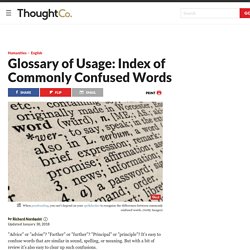
"Farther" or "further"? "Principal" or "principle"? It's easy to confuse words that are similar in sound, spelling, or meaning. But with a bit of review it's also easy to clear up such confusions. In our Glossary of Usage you'll find more than 300 sets of commonly confused words — with links to definitions, examples, usage notes, and practice exercises that should help you keep these words straight.
Obsolescent and ObsoleteOfficial and OfficiousOral and VerbalOrdinance and Ordnance "Advice" or "advise"? In our Glossary of Usage you'll find more than 300 sets of commonly confused words — with links to definitions, examples, usage notes, and practice exercises that should help you keep these words straight. Obsolescent and ObsoleteOfficial and OfficiousOral and VerbalOrdinance and Ordnance.
English On The Go Ep 7: Rain, rein and reign. English On The Go Ep 6: Loose or lose. 'Win', 'earn' and 'gain' - Learners' Questions. English On The Go Ep 5: Threw, through or thorough. English On The Go Ep 3: To, too or two. English On The Go Ep 2: Stationary vs stationery, principal vs principle. 'Tough', 'rough' and 'stiff' - Learners' Questions. Advising Others to Take Your Advice. This week, we answer a question from Ali in Iran.

He writes, Question: “I want to know differences between the words 'advise' and 'advice'. Are they the same with different spellings?” – Ali, Iran Answer: Dear Ali, The two words you asked about have somewhat different meanings. The noun form of the word, “advice,” is written with the letter c, which is said like /s/. Let us look at sentences with these words, starting with the verb advise. It’s the cabinet’s job to advise the president. Nutrition experts advise that we eat five servings of fruit and vegetables every day. The professional traders advise against selling stock today. Now, let’s look at the noun advice. People often look on the internet for medical advice before visiting a doctor. My brother gave me good advice: finish my homework and go to bed. What's wrong with "with regards to"?
Luck and lucky. We use the noun luck and the adjective lucky to talk about good things happening by chance, and not because of our own efforts: A:Helen won first prize in an online competition, a two-week holiday in Italy.B:Oh, that’s nice!

I never have any luck. I never win anything. It was a lucky coincidence that the train was late, because I was also late getting to the station. Common Errors in English Usage and More. Lieu is French for “place” and the expression “in lieu of” means “in place of.”
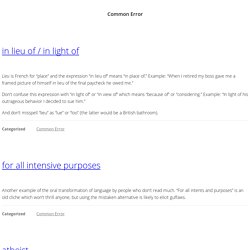
Example: “When I retired my boss gave me a framed picture of himself in lieu of the final paycheck he owed me.” Don’t confuse this expression with “in light of” or “in view of” which means “because of” or “considering.” Example: “In light of his outrageous behavior I decided to sue him.” And don’t misspell “lieu” as “lue” or “loo” (the latter would be a British bathroom). Another example of the oral transformation of language by people who don’t read much. Language quizzes on animals, trending words and our Open Dictionary. Thinking or Remembering? Confusing Words and Homonyms. More Confusing Words and Homonyms Quiz. <div class="banner-container -notice" data-banner="noscript" hidden><div class="banner-block"><h6 class="banner-title title"><i class="fa fa-info-circle"></i> Enable<br>JavaScript</h6><p class="banner-text text">Uh oh!
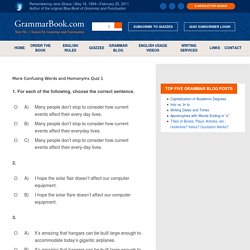
It looks like you have JavaScript turned off. While most of our site should function with out, we recommend turning it back on for a better experience. Homophones Archives - Copyediting.com. BBC Learning English - Course: English In A Minute / Unit 1 / Session 43 / Activity 1. BBC Learning English - Course: English In A Minute / Unit 1 / Session 41 / Activity 1. Learn English - Common Errors. Learn English Vocabulary - Confusable Word. Arabic.britannicaenglish. Arts and humanities. Grammar Girl #656. ‘Relapse’ or ‘Recur’? 'Kneeled' or 'Knelt.' ’Methinks.’ Everyday Grammar: Commonly Confused Words, Part Two. Everyday Grammar: Words That Are Not Words, But Are Words Part 1. Everyday Grammar: Words That Are Not Words, But Are Words Part 2.
Everyday Grammar: I.e. & E.g. BBC Learning English - Towards Advanced Unit 13 - Native speaker mistakes 2. BBC Learning English - Towards Advanced Unit 11 - Native speaker mistakes. Confusing Words. The Blue Book of Grammar and Punctuation. More Confusing Words and Homonyms (Advanced Level) Quiz. <div class="banner-container -notice" data-banner="noscript" hidden><div class="banner-block"><h6 class="banner-title title"><i class="fa fa-info-circle"></i> Enable<br>JavaScript</h6><p class="banner-text text">Uh oh!
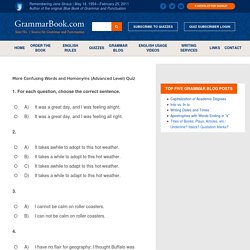
It looks like you have JavaScript turned off. While most of our site should function with out, we recommend turning it back on for a better experience. The Blue Book of Grammar and Punctuation. <div class="banner-container -notice" data-banner="noscript" hidden><div class="banner-block"><h6 class="banner-title title"><i class="fa fa-info-circle"></i> Enable<br>JavaScript</h6><p class="banner-text text">Uh oh!
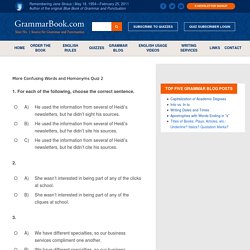
It looks like you have JavaScript turned off. While most of our site should function with out, we recommend turning it back on for a better experience. The Blue Book of Grammar and Punctuation. The Blue Book of Grammar and Punctuation. The Blue Book of Grammar and Punctuation. The Blue Book of Grammar and Punctuation. <div class="banner-container -notice" data-banner="noscript" hidden><div class="banner-block"><h6 class="banner-title title"><i class="fa fa-info-circle"></i> Enable<br>JavaScript</h6><p class="banner-text text">Uh oh!
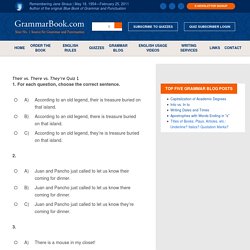
It looks like you have JavaScript turned off. While most of our site should function with out, we recommend turning it back on for a better experience. </p><button class="banner-toggle button"><i class="fa fa-times-circle"></i><span class="_visuallyhidden">Hide Notice</span></button></div><! --/.banner--></div><! --/.banner-wrapper--> Remembering Jane Straus | May 18, 1954—February 25, 2011 | Author of the original Blue Book of Grammar and Punctuation. The Blue Book of Grammar and Punctuation. <div class="banner-container -notice" data-banner="noscript" hidden><div class="banner-block"><h6 class="banner-title title"><i class="fa fa-info-circle"></i> Enable<br>JavaScript</h6><p class="banner-text text">Uh oh!

It looks like you have JavaScript turned off. While most of our site should function with out, we recommend turning it back on for a better experience. </p><button class="banner-toggle button"><i class="fa fa-times-circle"></i><span class="_visuallyhidden">Hide Notice</span></button></div><! --/.banner--></div><! The Blue Book of Grammar and Punctuation.
<div class="banner-container -notice" data-banner="noscript" hidden><div class="banner-block"><h6 class="banner-title title"><i class="fa fa-info-circle"></i> Enable<br>JavaScript</h6><p class="banner-text text">Uh oh!

It looks like you have JavaScript turned off. While most of our site should function with out, we recommend turning it back on for a better experience. The Blue Book of Grammar and Punctuation. <div class="banner-container -notice" data-banner="noscript" hidden><div class="banner-block"><h6 class="banner-title title"><i class="fa fa-info-circle"></i> Enable<br>JavaScript</h6><p class="banner-text text">Uh oh!
It looks like you have JavaScript turned off. While most of our site should function with out, we recommend turning it back on for a better experience. The Blue Book of Grammar and Punctuation. <div class="banner-container -notice" data-banner="noscript" hidden><div class="banner-block"><h6 class="banner-title title"><i class="fa fa-info-circle"></i> Enable<br>JavaScript</h6><p class="banner-text text">Uh oh! It looks like you have JavaScript turned off. While most of our site should function with out, we recommend turning it back on for a better experience. The Blue Book of Grammar and Punctuation. <div class="banner-container -notice" data-banner="noscript" hidden><div class="banner-block"><h6 class="banner-title title"><i class="fa fa-info-circle"></i> Enable<br>JavaScript</h6><p class="banner-text text">Uh oh!
It looks like you have JavaScript turned off. While most of our site should function with out, we recommend turning it back on for a better experience. The Blue Book of Grammar and Punctuation. <div class="banner-container -notice" data-banner="noscript" hidden><div class="banner-block"><h6 class="banner-title title"><i class="fa fa-info-circle"></i> Enable<br>JavaScript</h6><p class="banner-text text">Uh oh!
It looks like you have JavaScript turned off. While most of our site should function with out, we recommend turning it back on for a better experience. </p><button class="banner-toggle button"><i class="fa fa-times-circle"></i><span class="_visuallyhidden">Hide Notice</span></button></div><! The Blue Book of Grammar and Punctuation. The Blue Book of Grammar and Punctuation. Everyone vs. Every One. BBC Learning English - Course: English In A Minute / Unit 1 / Session 25 / Activity 1. Confusables: Assure, Ensure, and Insure - Copyediting.com.
Spellcheck probably won’t help you choose correctly among assure, ensure, and insure. In fact, because of some overlap in definitions, you might have some problems yourself deciding which word is the right one, especially if you’re working with historical texts. According to Etymonline, ensure and insure both probably extend from the same Anglo-French root, which in turn may have been influenced by or been an alteration of an earlier word that developed into assure. So the meanings of these three words have long overlapped — and likely given pause to writers and editors for several centuries. But over time, they have more or less found their own identities. Come or go ? We use come to describe movement between the speaker and listener, and movement from another place to the place where the speaker or listener is. We usually use go to talk about movement from where the speaker or listener is to another place.
BBC Learning English - Course: English In A Minute / Unit 1 / Session 14 / Activity 1. BBC Learning English - Course: English In A Minute / Unit 1 / Session 12 / Activity 1. BBC Learning English - Course: English In A Minute / Unit 1 / Session 3 / Activity 1. BBC Learning English - Course: English In A Minute / Unit 1 / Session 11 / Activity 1.
Common Errors in English Usage and More. "every one" everyone at DuckDuckGo. Common Mistakes in English for ESL Learners. Common mistakes are mistakes that even native speakers make on a regular basis. The most common of these common mistakes include 'its or it's', 'two, to or too', 'would of instead of would have', and more. The best way to not make these common mistakes is to become familiar with them through a wide variety of examples. You can use each of these pages as a starting point to practice not making these common mistakes in the future. Each page has a clear explanation with example sentences.
Has gone to vs. Has been to. Raise vs rise: Learn English in a minute! Common Errors in English Usage and More. What is an error in English? The concept of language errors is a fuzzy one. I’ll leave to linguists the technical definitions. Here we’re concerned only with deviations from the standard use of English as judged by sophisticated users such as professional writers, editors, teachers, and literate executives and personnel officers. SEMINAR VS. LECTURE. More perfect - Language errors of the rich and famous. We the people of the United States, in order to form a more perfect union, establish justice, insure domestic tranquility, provide for the common defense, promote the general welfare, and secure the blessings of liberty to ourselves and our posterity, do ordain and establish this Constitution for the United States of America.
—Preamble to the United States Constitution, 1787 Most of us, whether we realize it or not, have been taught something of absolute adjectives. These are words which permit no variation of degree; something either is this adjective, or it is not, and there is no wiggle room. Farther, farthest or further, furthest.
"High," "tall," and "height" BBC Learning English - Course: intermediate / Unit 8 / Session 1 / Activity 3. Category:English Language - Difference and Comparison. Review Quiz on Commonly Confused Words. Words that are similar in sound, spelling, or meaning can be confusing. But if you have studied our Glossary of Usage: Commonly Confused Words, you should have no trouble completing this short review quiz. Review Quiz: Commonly Confused Words Choose the word in parentheses that completes each sentence correctly. When you're done, compare your responses with the answers on page two (where you'll also find links to discussions of these commonly confused words). She worked harder (than, then) she had ever worked before.If I had known your number, I would (have, of) called.The bingo game has (all ready, already) started.
OUP Companion web site:Commonly Confused Words. This list contains many of the pairs of English words that look or sound alike but have different meanings. Using the list will help you to understand the difference between the words and to choose the right word for the particular situation. What is the difference between learn and study and how are they used? What is the difference between learn and study and how are they used? — Lucie, Armenia. Commonly Confused Words.
Loan versus Lend. Loan, Lend, Loaned, Lent. Lend or borrow ? Leant vs lent. Advice or advise ? ‘On time’ vs. ‘in time’ – the difference. BBC World Service. Warranty Vs. Guarantee - Everything After Z by Dictionary.com. What's The Difference Between "i.e." And "e.g."? - Everything After Z by Dictionary.com. Affect or effect. Ambiguous Words. What's The Deal With Piqued, Peeked, And Peaked? - Everything After Z by Dictionary.com. 100 Words Almost Everyone Confuses and Misuses. Learning English. Learning English. Learning English. BBC World Service. Allot vs. A Lot, Allowed vs. Aloud, All ready vs. Already, All right vs. Alright, Altar vs. Alter, All together vs. Altogether.
'All Right' vs. 'Alright' 'All Right' vs. 'Alright'